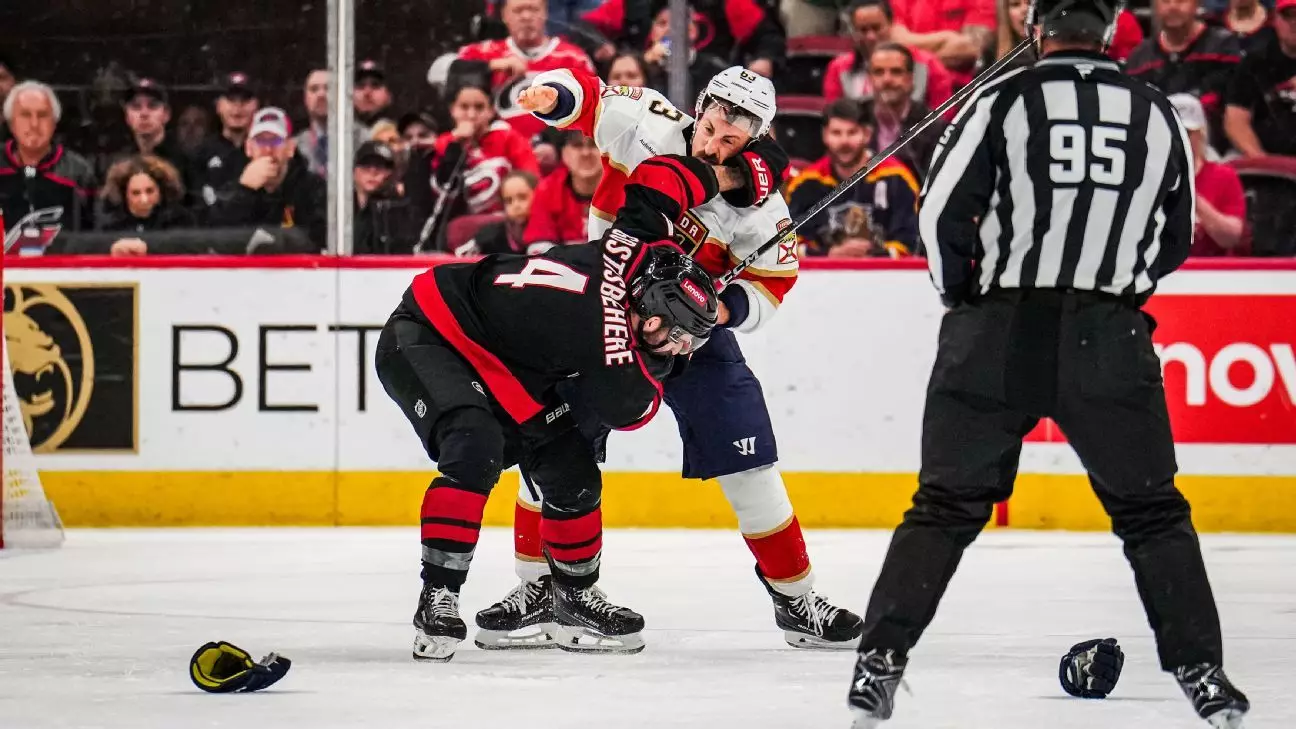In high-stakes playoff hockey, tension runs high. The Carolina Hurricanes, under the leadership of coach Rod Brind’Amour, face a crucial test against the Florida Panthers—a team known for its knack for execution and mind games. Following Florida’s 5-2 victory in Game 1 of the Eastern Conference finals, Brind’Amour emphasized the importance of mental acuity, urging his players to resist the emotional traps that can arise from physical aggression. The stakes could not be higher, given that the Hurricanes are on a 13-game postseason losing streak in this round, with the last five losses suffered directly at the hands of the Panthers.
The Hurricanes must “stick to what is going to win us games,” as Brind’Amour aptly summarized. This isn’t merely about physicality; it’s about mastering the psychological aspect that can so easily lead to self-inflicted wounds.
Consequences of Retaliation
In the ebb and flow of Game 1, live performance actions clearly showcased a learning moment. Carolina center Sebastian Aho’s ill-timed roughing penalty against Anton Lundell set the stage for a series of consequences. Instead of leveraging a power play, the Hurricanes found themselves short-handed, a direct invitation for the Panthers to strike. Carter Verhaeghe converted on that opportunity, utilizing what felt like a calculated opening—a play straight from Florida’s playbook of thriving on opponents’ faults.
Brind’Amour’s insistence on discipline shines through as a cornerstone of successful playoff hockey. Retaliatory antics like Aho’s not only undermine a team’s strategic framework but also amplify the opposite team’s confidence. “Retaliation penalties are not going to get it done,” he reasoned, keenly aware that all it takes is a singular lapse to shift the momentum in favor of the opposition.
Understanding the Opponent’s Strategy
What makes the Panthers particularly effective is their acute understanding of how to prompt reactions from their rivals. They blend physicality with psychological prowess, relying on their reputation to rattle opponents. Consider the case of defenseman Shayne Gostisbehere, who shot the puck at Brad Marchand in frustration. Such moments highlight the fine line between emotional engagement and thoughtless aggression.
As the Hurricanes reflect on the past-game dynamics, it becomes increasingly clear that they must embrace self-control as a weapon. The Panthers, after absorbing hits, often display resilience that comes from their experience. This temperament allows them to capitalize on the moment when their rivals falter, effectively reinforcing the idea that composure is the hallmark of playoff hockey.
Captaincy and Leadership in Times of Choice
In pivotal moments of adversity, leadership plays a gravitational role. Jordan Staal, the Hurricanes’ captain, provided a voice grounded in experience when he acknowledged that limiting mistakes is critical. It is imperative for the players to foster a more assertive, smart approach, transforming chaos into opportunities that favor Carolina’s abilities.
With a playoff static of having won their five games when scoring first and being 3-3 when failing to do so, leaders like Staal face the essential challenge of guiding younger players through an emotionally charged landscape. Coaching strategies need to be as fluid as the game itself, adapting to moments of frustration while maintaining focus.
Resilience as the Path Forward
The resilience demonstrated by players like Panthers’ goaltender Sergei Bobrovsky highlights another layer of strategic gameplay. Bobrovsky’s calm under sustained pressure is a feat that underscores the importance of poise in playoffs. “I just focus on my things and try not to think about that,” he remarked, illustrating that personal investment in the game’s progression can be the most crucial factor—reminding both him and his team that management of emotional triggers is equally as important as physical plays.
Beyond physical prowess, it comes back to the mentality on and off the ice. Teams that embrace a proactive approach to adversities and distractions hold the key to not just surviving but thriving in the playoff atmosphere.
As the Hurricanes gear up for Game 2 in Raleigh, the initiative will lie in their ability to evolve past impulsive reactions and harness pressure into strategy. Anticipation builds, as fans and players alike look forward to witnessing whether Carolina can rediscover its mental strength and retaliate with a clear, focused game rather than an emotionally reactive one. In the multifaceted world of playoff hockey, victory hinges not just on physical wins but on mastering emotional mastery.


Leave a Reply